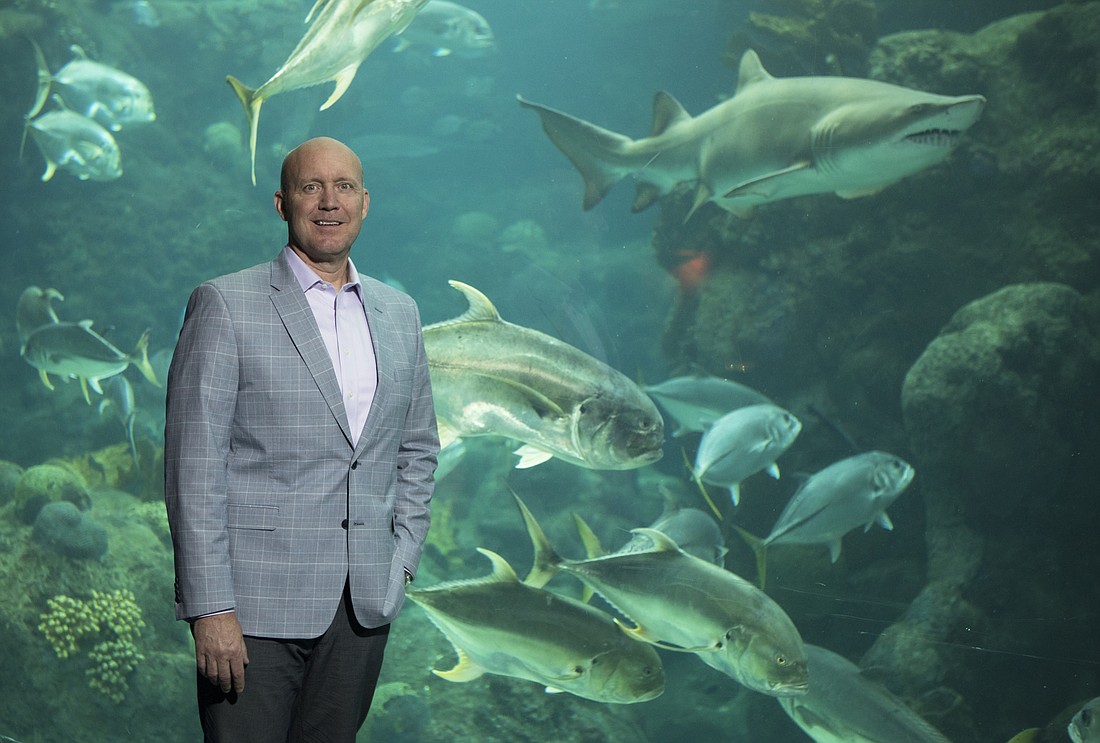- November 25, 2024
-
-
Loading

Loading

After nearly 17 years, Chicago native Roger Germann uprooted his family and left his job as the executive vice president of the Windy City’s Shedd Aquarium to become CEO of the Florida Aquarium.
Now, two years into the job, he’s ready to move forward with ambitious initiatives. Targets include broadening the institution’s philanthropic base and helping it live up to its name as a force for environmental and educational good across the state, not just Tampa Bay.
“Make no little plans,” says Germann, 50, quoting noted Chicago architect and urban planner Daniel Burnham. The saying also describes Germann’s approach to his new role — and offers a guide for other leaders who seek to make a splash with their organization.
“Getting our message out about being a nonprofit that has a significant impact on education, the community and the environment will grow support.” Roger Germann, CEO of the Florida Aquarium
With a 2017-18 budget of $25 million, the nonprofit aquarium, which opened in 1995, is a much larger and more complex operation than it would appear at first glance, by combining a downtown Tampa tourist attraction with conservation and education components spread statewide. It’s also a model of efficiency among nonprofits; it generates 95% of its funds via earned revenue, the remainder coming from federal, state and local grants, as well as private philanthropic sources.
Germann recently spoke to the Business Observer about topics related to his vision for the Florida Aquarium, whose most recent win is the June opening of a $4 million, 19,000-square-foot sea turtle rehabilitation center at its 20-acre conservation facility in Apollo Beach.
Why did you leave a great career in your hometown of Chicago to come to Tampa?
A place like Chicago, it’s a place that’s been established for a very long time. The difference here is this is a community that’s exploding at a level that hasn’t been seen in a long time. People can say all they want about Nashville and Austin, whoever we want to benchmark against. Nobody’s growing at the level [Tampa is.] But also from a career standpoint, it’s a world-class aquarium, and it’s an honor to get to run this operation.
The aquarium had a strong year in 2018, with membership attendance rising 44% and revenues up 30%. How do you keep that momentum going?
It will come from working with individual donors and definitely working with the corporate community, so they see us as a nonprofit that really wants to invest in our mission. I think our impact, our ROI, is second to none. Getting our message out about being a nonprofit that has a significant impact on education, the community and the environment will grow support.
You talk about wanting to grow the aquarium’s philanthropic support. Why is that a priority when you’re having so much success getting people to come through the turnstiles?
We want to diversify our portfolio. I’ll often say, "I don’t want to not save a sea turtle today because five people didn’t show up at the door." I’ll say that with tongue in cheek, but that is the reality of it. If we can diversify our revenue sources more, we can connect at a greater level. Support from the city and county has been great, but quite frankly, we want to focus more on not having to rely on that.
You’ve spoken of your desire for the Florida Aquarium to be a resource for the entire state, not just Tampa Bay. What’s inspired you to look beyond your backyard and the grassroots support you enjoy here?
At the highest level, it’s just the reality of living up to our name. That means we need to perform. If we want to be known as the aquarium for the nation’s third-largest state and grow into that name, we’ve got to be a statewide asset for conservation programs, for education programs. We educated about 100,000 kids last year, but we need to do more. Although we don't have the same resources as a Disney or Universal, we should be able to provide an experience to the best level we can, one that mirrors expectations.
The Florida Aquarium will be 25 years old in 2020. How do you intend to celebrate that milestone?
Stay tuned for the next conversation. We’re starting to decide what the plans will look like. It will have more of an eye to the future of what the next 25 years will hold because you don’t want to stare at shadows if you want to look ahead and figure out where you’re going. We’ve got some exciting plans.